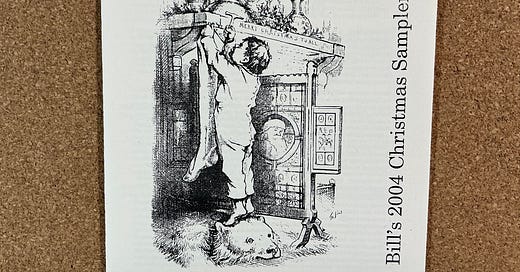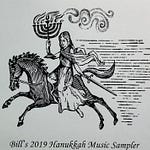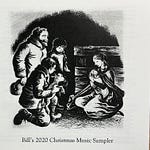Playlist:
It’s Christmas Cindy Church, with Quartette 2:51
Sing to the Baby Straw into Gold 1:38
Almost Day Penny Seeger and family 1:32
Rasta Reindeer The Bobs 3:30
Six White Boomers Bucko & Champs 3:15
Last Month of the Year The Tarbox Ramblers 2:29
Music notes
It’s Christmas This song was written by Cindy Church who lives in Alberta, and Nathan Tinkham who lives on Gabriola Island here in BC. Cindy was a member of now-disbanded Quartette, which when this was recorded also included Colleen Peterson, Sylvia Tyson and Caitlin Hanford. Cindy is the lead singer for this number, which was on their 1996 It’s Christmas album.
The song reminds me of my own childhood Christmases, growing up in Minnesota in the 1950s. We couldn't open up our presents until after mass. As the oldest, I got to go to our church's spectacular midnight masses with my Dad, but I had to wait until Mom and my younger sisters came home from church on Christmas morning. Our family Christmas photos show Michele and Jaci dressed up in their Sunday best, and me in my scruffy pyjamas, with all of us in the midst of mountains of presents and snowdrifts of wrapping paper.
Sing to the Baby (abridged) This song was written in 1988 by dulcimer-maker John Elwood, of Elberton in Eastern Washington State. It is sung by a Portland, Oregon-based trio called Straw Into Gold and is from their 1995 non-Christmas album Substance and Essence. I first heard them when I attended their harmony singing workshop at the Seattle Folklife Festival in 2004. The group was comprised of Laurie Miller, Nadine Sanders and Pam Sloper and was originally formed to accompany Nadine’s weaving thesis show at the Oregon School of Arts and Crafts.
Almost Day One doesn't usually associate the legendary folk and blues artist Leadbelly (Huddie Ledbetter) who spent much of his life in prison for violent crimes with Christmas music. But he either wrote this song, probably in the 1920s or '30s, or had learned it from traditional sources. Ledbetter never experienced commercial (or personal) success during his lifetime, but after his death he has come to be recognized as one of America's most influential folk artists. He is also a member of the Rock & Roll Hall of Fame, and in 1998 the US issued a postage stamp in his honour.
The Weavers’ recording of this song in 1949 did not attract much attention. But the following year their recording of another Leadbelly song – Goodnight Irene – rose to #1 on the pop charts and began the first American folk music revival. This version is sung by Penny Seeger, with her brother Mike, his daughter Kim, and their niece Kitty (whose mother is Peggy Seeger, and father is Ewan MacColl) providing the vocal percussion.
Mike and Penny's father was a noted ethnomusicologist, and their mother, Ruth Crawford Seeger, was a music teacher, composer, folk music song-catcher, and the author of the important folklore study American Folk Songs for Christmas that was published posthumously in 1953.
That Christmas songbook proved to be a very important resource for the second American folk music revival in the late 1950s and early ‘60s when several folk singers and groups who big hits on Billboard’s pop music charts wanted to release Christmas albums. This recording is from a 2 CD album by that same name which was recorded by Ruth’s family in 1989 using Ruth’s songs and arrangements, and a few others that Ruth would undoubtedly have included had known about them at the time.
Rasta Reindeer This is a reggae parody of Little St. Nick. The original version the song had been written in October 1963 by Brian Wilson and Mike Love of the Beach Boys when that group was at the peak of their popularity. By December was one of the most popular songs on the airwaves and became the centrepiece for The Beach Boy's Christmas Album the following year – which was just one of their four best-selling albums in that year. This variation on that Beach Boy hit was written and recorded in 1996 by the a cappella group The Bobs, which had been formed in 1981 by a group of laid-off singing telegram deliverers.
Six White Boomers Six White Boomers was written by Rolf Harris and John D. Brown for a local TV Christmas special in Perth, Western Australia. They thought that it was crazy to sing the traditional English and American seasonal songs about ice and snow when it was hot enough to fry eggs on the sidewalk. Harris' 1965 recording of it was a big international hit. My nephews Matt and Steve brought the 1995 album Aussie Christmas with Bucko & Champs CD back for me from Australia, where their family had been living for three years. It included this rendition of the song. Bucko and Champs are Greg Champion (who is primarily known for his Aussi football songs) and Colin Buchanan (who is primarily know for religious and Christian-rock music.)
Last Month of the Year My daughter Gillian heard the Boston-based Tarbox Ramblers perform this song at the 2004 Salmon Arm Roots and Blues Festival (held in July) and knew that it would appeal to me. She told them about my samplers and traded them a bottle of her home-made cherry wine for their CD, which is called a fix back east.
The Last Month of the Year (under the name January, February) was collected in the 1940s by Alan Lomax from an Alabama laundry worker named Vera Ward Hall, who sang it as part of the Christmas lesson for her Sunday school class. It may be traditional, but more likely that she wrote it herself, possibly in the 1920s or '30s. The Kingston Trio's 1960 recording of it was the one of the group's most popular Christmas songs, and it has gone on to become a Christmas staple in American folk music circles. I wrote a deep dive into Vera Ward Hill and this song in 2023 on my December 4 Bill’s Midwinter Music newsletter and you can hear Lomax’s field recording of her singing in on my December 8 one.
Sampler-making recollections
The run-up to Christmas and New Year’s Day is the only time of year that brings forth its own musical season. Oh yes, there are songs about other seasons, but none have anything like the midwinter holiday musical repertoire. I have long suspected that part of the appeal the traditional Christmas music for many adults is that it brings back memories of their childhood (which may also explain why some people react quite negatively to Christmas music.)
My 2004 sampler began as my attempt to compile a Christmas album for children, but it evolved into what I thought of as a children’s Christmas album for grown-ups. It’s my only sampler that ever went through a focus group. I tested it out on young children to see if it would worked as a children’s album. It did, but my real intention by that stage was to compile an album that would help adults re-live the joy of Christmas.
This was perhaps my most complexly structured sampler. I began by thinking it should like a musical Christmas stocking or gifts under a tree, with each selection bringing a new and unexpected surprise. But it evolved to be structured as a chronology tracing music that reflected a child’s experiences on Christmas Eve and Christmas Day.
The first couple of songs are intended to bring listeners back in time to a Christmas Eve in the early 1950s, the time of my own early childhood. Then there are singalong songs and rounds as the parents entertain the kids who eagerly look forward to the next day and try to keep them calm. That is followed by opening one gift on Christmas Eve (which had been a Christmas tradition in my wife’s family), and then lullabies and a spooky bedtime story. The next songs convey kid’s sweet dreams about children bringing peace to the whole world.
Then they wake up on Christmas morning and get increasingly “exité” (my mother’s French-Canadian word for rambunctious – I used to hear that word a lot.) The kids (and adults) then have a musical sugar-buzz for the rest of the day!













Share this post